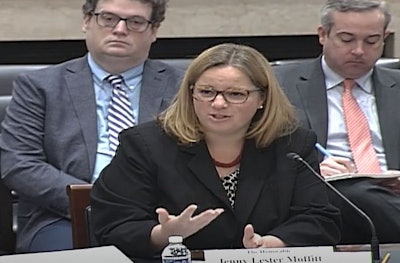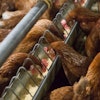
In a recent blog post, I questioned whether members of Congress were even talking about the possibility of vaccinating against highly pathogenic avian influenza (HPAI), and I was critcial of Rep. Tracey Mann for not responding when I essentially asked him that same question.
I have my answer now, and it is yes. And it isn’t just the possibility of vaccination they are talking about, numerous solid questions about HPAI came up during the hearing.
Shortly after that blog appeared online, I got a call from an apologetic member of Mann’s staff, who assured me that it is at least on the mind of Mann, R-Kansas, and that he fully expected that to be a topic of discussion of a then-upcoming hearing held by the House Agriculture Committee Subcommittee on Livestock, Dairy and Poultry, of which Mann chairs.
The two key witnesses in that hearing were USDA Marketing and Regulatory Programs Under Secretary Jenny Moffitt, and APHIS Veterinary Services Associate Deputy Administrator Alecia Naugle.
Mann opened the hearing by saying: “Today’s hearing is particularly timely as we’re in the middle of the most devastating highly pathogenic avian influenza (HPAI) outbreak on record and African swine fever (ASF) in the Dominican Republic and Haiti is dangerously close to our shores. … The new farm bill must continue to address these risks to animal health while bolstering a long-term ability for U.S. animal agriculture to be competitive in a global marketplace and provide consumers around the world, safe, wholesome affordable food produced in a sustainable manner.”
And similar sentiments were shared by Subcommittee Ranking Member Jim Costa, D-California.
“We’ve all seen first-hand how high pathogenic avian flu has devastated domestic poultry populations, where depopulations have had to take place,” said Costa. “We’ve got to continue to refine and improve our approach to address animal disease, and USDA needs all the tools to guarantee a robust response.”
Costa then went on to ask Moffit if a strategy is being developed “toward maintaining our trade efforts if we have efforts to vaccinate.
Moffitt said APHIS is “looking at all different tools in the tool chest,” and of the many things they are considering are a potential vaccines impact on animal and human health, the trade impacts and the actual implementation of a vaccine strategy.
When questioned further by Scott DesJarlais, R-Tennessee, Moffitt said that Dr. Rosemary Sifford, APHIS chief veterinary officer, would be soon meeting with animal health officials from across the globe at an upcoming World Organisation for Animal Health (WOAH) meeting, and said that a key topic of discussion is “if we need to look at vaccination differently.”
Partnering with wildlife agencies
Randy Feenstra, R-Iowa, noted that in his state, HPAI’s impact has been “very extreme,” with approximately one fourth of the birds depopulated in the current outbreak coming from Iowa. While he praised APHIS and Iowa Agriculture Secretary Mike Naig for their efforts, especially noting that the depopulation times degreased from about 15.5 days in 2015 to about four days in 2022, he wanted to know what else could be done to minimize the risk. He asked wondered if there was any sort of “protective modeling” that could be done or is being done.
Moffit said a major area of focus is working with producers to make sure they are reducing their farms’ attractiveness to wild bird populations, and state and federal wildlife agencies have been working with APHIS on this.
She also pointed out that APHIS Wildlife Services has tested more than 2 million wild birds, and they are studying these wild species “to know where they are traveling so our industry can be prepared."
Educating small producers and backyard farmers
Chellie Pingree, D-Maine, said HPAI is affecting her state differently than many of the other states, with no commercial poultry operations affected, but other animals testing positive.
“Maine is not as large of a poultry producing state as it had been, but there are still small operations and backyard farmers that need to be concerned. Unfortunately, in a backyard flock you have more opportunities for making that connection with wildlife and I know you’ve been talking quite a bit about that,” said Pingree.
“In addition to the wild birds in Maine, we have had avian influenza detected in our harbor seals and so because we have a lot of saltwater farming, a lot of coastal farming, that’s something we’re concerned about too. What are you doing to educate the farmers?”
Moffitt said a big education program is the Defend the Flock program, and she gave pone example of its effectiveness. The first case of HPAI to be confirmed in commercial poultry in 2022 occurred in Indiana, and because of information shared through Defend the Flock and other educational initiatives, the operator of the farm was able to suspect that the turkeys on the property may have had HPAI and animal health authorities were contacted.
Workplace safety
Since HPAI is transmissible to humans, Don Davis, D-North Carolina, asked what APHIS is doing to assure workplace safety.
Naugle replied that anyone who is working on a response team is required to wear appropriate personal protective equipment, and a safety officer is on the premises anytime HPAI response is conducted. APHIS also collaborates with local and state health departments, as well as the Centers for Disease Control and Prevention (CDC) to help monitor workers for signs of the flu.
Other topics addressed
The committee also spent time discussing ASF, protecting the aquaculture industry, gene editing in animals, bovine spongiform encephalopathy (BSE) and making sure APHIS continues to be well staffed as present employees reach retirement age.
I felt reassured with the questions that were being asked at this hearing, as they showed a good sense of awareness and concern of the HPAI and ASF situations. There was the one disappointing exception. That was Derrick Van Orden, R-Wisconsin, who asked about “African swine flu” and if the U.S. was importing pigs from Africa. And even after that display of agricultural ignorance, he still spoke rudely and in a condescending tone to Moffitt and Naugle. I hate to say it, but I guess in this day and age of bad behavior in Washington, to have only one disappointment in a congressional hearing isn't too bad.
I want to thank Mann’s staff for alerting me to this hearing, which can be found on YouTube if you’d like to view it.



















